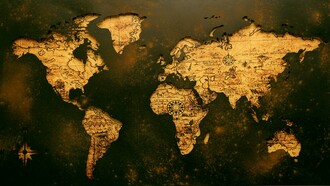In periods of great social and political polarization, names, concepts and ideologies are subject to great semantic turmoil. The confusion created is intentional, and is one of the privileged instruments of the propaganda war to manipulate public opinion. Elucidating what the labyrinth of propaganda intends to hide in the bombastic revelations it makes incessantly is no easy task. The difficulty is all the greater because the lies are often mixed with half-truths. Let's look at a few examples.
Extremism
It is part of the propaganda war to turn the opponent you want to target into an extremist. Extremism is often associated with fundamentalism, dogmatism, etc. The extremist is always the other. Thus, terrorism is considered extremism, but state terrorism is considered national security. Extremism is contrasted with moderation and centrism. In countries of liberal democracy, there are two opposing extremisms, the extreme left and the extreme right. Between them is moderation and centrism. There are, of course, forces conventionally known as the far-left and the far-right, the former now on the verge of extinction and the latter on the rise. But in terms of political influence today, the greatest extremism is centrism, extreme centrism.
The economic (dis)order imposed by global neoliberalism is made up of an economic orthodoxy so dogmatic and fundamentalist that it prevents peripheral or semi-peripheral states from having any margin of autonomy. Any movement towards greater social justice is radically punished by the central banks or international agencies. In fact, this is another manipulation of language: central banks are "independent" so that they can be strictly dependent on global neoliberalism. The polarization is thus between three extremisms, rather than two, and here lies much of the confusion in citizens' choices. In other words, moderation has disappeared from the world political scene as soon as it is enthroned as a political virtue by the propaganda of conformism.
Left and right
The polarization between left and right has been the great marker of ideological divisions since the French Revolution and remains in force in Europe and in Europe's areas of political and cultural influence, in Latin America, in India (in part) and in the former colonies of total white supremacy: the USA, Canada, New Zealand, and Australia. In Africa, it is much less prevalent, and is practically absent in many regions of Asia. In these regions, political polarizations exist, but they are called different things.
The propaganda war takes on two versions in this area: either there is no distinction between left and right, or it changes the meanings of the signifiers and considers what has always been considered right-wing to be left-wing, and what has always been considered left-wing to be right-wing. This is the realm of half-truths. In fact, the differences between left and right have been getting smaller. This is one of the reasons why the extreme right is now taking up flags that were traditionally those of the left without anyone being alarmed. The extreme case is the recent elections in the UK. The Labour party won the elections by an overwhelming majority. However, contrary to what might be expected, the differences between the two parties are not very great, especially on the international stage. For example, both are fervent followers of neoliberalism, both are supporters of continuing the war in Ukraine and both continue to supply arms to Israel. This is just an extreme case of something that is happening in other countries. Under these conditions, voters are condemned to vote in elections (as long as they believe in them) as a protest vote.
Voting from protest to protest, from frustration to frustration. How long democracy can withstand being just an instrument of protest remains to be seen. Whenever there is a difference between the left and the right in terms of political options, much more analytical care is needed today than before. For example, in Europe, the vast majority of the so-called left is in favour of continuing the war in Ukraine, supports militarism, does not mobilize for the struggle for peace, has stopped talking about capitalism and is betting on neoliberalism with a human face (something impossible to imagine). Where the differences exist and are important are: immigration, the ecological struggle, the defense of the LGBTQI+ population, women's reproductive rights, and conceptions of the family. These are extremely important issues and required a lot of struggle to achieve.
But that's not all. They don't invest in the anti-capitalist struggle or the anti-colonialist struggle, which were among the founding struggles of the left. Without these, none of the others will have sustainable success. Just look at what is happening with abortion rights in the US. In conclusion, the confusion between left and right is partly the fault of the organizations that claim these designations.
Liberation and dependency
This binarism has evolved semantically since the mid-19th century. It was initially applied to the period of historical colonialism and the resistance against it. The opposite of liberation began as colonialism, but as the colonies became politically independent, the aspiration of independence was reduced to the terms of dependence to which the former colonies were subjected. These terms (unequal contracts, monopolies of companies from the colonizing country, financial dependence, continued exploitation of natural resources) constituted what was called neo-colonialism (Kwame Nkrumah, 1965) or colonialism without adjectives, to distinguish it from historical colonialism (territorial occupation by a foreign power).
Today, the liberation/dependence binary takes on various meanings, but they all disguise the absence of liberation and the substitution of one dependency for another. Thus, the propaganda war tells us that Europe has freed itself from dependence on Russia for the supply of natural gas and oil to hide the fact that Europe has become dependent on the US, paying four or five times more for these products than it paid Russia, which is the cause of Europe's current economic decline. The BRICS+ organization tends to be an attempt to escape this alternation, but there is no guarantee that dependence on China is not on the horizon.
Peace and war
American historians now agree that the country has almost always been at war since its foundation. This doesn't stop propaganda from turning the US into the great herald of peace, the guarantor of world peace, whose warlike interventions in the world have always been to guarantee peace. The lie is obvious, but it can only be discredited if the propaganda war succeeds in identifying the enemies of peace who threaten the world with total war. These countries are, first and foremost, Russia, which, according to the propaganda war, invaded Ukraine as a first step towards invading and conquering the whole of Europe.
The fact that Russia has never invaded Europe and has been invaded twice, once by Napoleon and once by Hitler, is of no interest to this narrative. But by far the most threatening country is China, as the last NATO summit enshrined—a global threat to peace. The fact that all the products the guests were using during the summit, from pens and tissues to microphones, sound installations, plates, and cutlery, were manufactured in China was of no relevance. Nor does it matter that no country in the global South believes this narrative and thinks that Russia or China are thirsty for war. They know that the opposite is true. The deep state of the US and the military-industrial complex that sustains it today are thirsty for war. This manipulation is so radical that those in the global North who defend peace are suspects, considered "peace terrorists," if you ignore the contradiction in terms.
Thus, NATO is considered a defensive alliance, when we all know that it was so only during the Cold War and that, since the fall of the Berlin Wall, it has become an offensive alliance with a sinister track record, from Yugoslavia to Libya and Syria, and which is now expanding into Africa, Australia, and the China Sea, disproving its own name (North Atlantic Alliance).
The other parallel reversal is the replacement of the concept of development with the concept of national security. US missions in Africa are predominantly aimed at national security (interestingly, if it's national, why are foreigners demanding that the "aided" countries guarantee their security?) For its part, the phrase "development aid" has almost disappeared from the international vocabulary. The very issue of migration is treated as a security issue (certainly for the countries you are trying to immigrate to, not the countries you are emigrating from).
Zionism and anti-Semitism
One of the central areas of the Western propaganda war is to equate criticism of Zionism with anti-Semitism. Since anti-Semitism is now considered a crime in some countries, criticizing Zionism is tantamount to committing a crime. It doesn't matter to the propaganda war that the two terms mean very different things, that many Jews are anti-Zionists. The important thing is to defend Israel, whatever it does, whether or not it is a pariah state, whether or not it is committing the most savage and barbaric genocide since the one committed against the Jews under Hitler. And here come other propaganda manipulations. For the latter, it is impossible to compare the Holocaust with the Gaza genocide, because there is only one Holocaust and there can be no other.
The lie that the propaganda war is trying to inculcate hides two realities, one old and the other tragically new. The first is that Israel is at the service of US imperialism in the Middle East, or rather in Western Asia. It is a key element in an eventual war with the only power that can stand up to them in the region, Iran. In fact, the role that the US neo-conservatives wanted to reserve for Ukraine was that of being the Israel of Europe, a country capable of putting an end to the pretension of relative autonomy that Europe wanted to have after 1945. The second is that the Holocaust no longer has a monopoly on the worst crimes committed by Europeans in the last hundred years. From now on there will be two holocausts, even if one of them is called genocide. Both are the result of the same European crime, even if in the second one Europe was enthusiastically supported by the USA.















